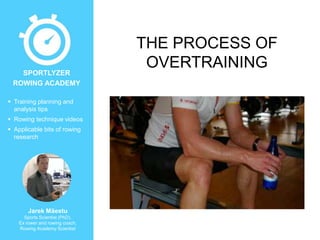
Overtraining
- 1. Training planning and analysis tips Rowing technique videos Applicable bits of rowing research Jarek Mäestu Sports Scientist (PhD), Ex rower and rowing coach, Rowing Academy Scientist SPORTLYZER ROWING ACADEMY THE PROCESS OF OVERTRAINING
- 2. SPORTLYZER ROWING ACADEMY What is overtraining? Overtraining can be called as an imbalance of training stress and recovery. That is too much training (and all other possible stressors like work, family, time lag etc.) followed by too little recovery that will result in decreased adaptation state. Overtraining is not always bad, but a common practice in the successful training plan. Training causes load to the body and therefore causes fatigue (decrease of the red line, Figure 1). During recovery the body restores its resources to a higher level. This can be called as the short-term training effect and is the basis for training adaptation, also called supercompensation. Figure 1. Adaptation effect to four training sessions. Blue bars indicate workouts, red line indicates body s adaptation.
- 3. SPORTLYZER ROWING ACADEMY Overtraining vs overreaching If a new training is followed before the full recovery for several times, it will result in a decrease in performance, or in other words – overtraining. This means that you train more than is possible to recover (Figure 2, yellow line). However, if a longer rest is applied, the body can still adapt to a new higher level (Figure 2, blue line) - this is called overreaching. Adaptation effect after multiple loads is usually higher than the effect that can be obtained with just a single load-recovery cycle. Figure 2. Manipulating with increased stress followed by longer recovery to maximize increased performance level.
- 4. SPORTLYZER ROWING ACADEMY What is overtraining syndrome? Applying high stress with little recovery during an extended period of time might cause a situation where the adaptation capability of the body could reach its limit and even after recovery the supercompensation effect might not be reached. The problem arises when even after two weeks of recovery the performance level remains lower than it was before the trainings (Figure 3). This situation must be avoided in the training process. Figure 3. Adaptation after too high training loads and too little recovery between trainings. The performance decreases and stays lower than where it was before applying the load.
- 5. SPORTLYZER ROWING ACADEMY The process at a glance Normal state Overtraining Overreaching Overtraining syndrome Overtraining The athlete can be brought to the overreaching state intentionally. Performance is decreased, however, if rest is administered the supercompensation effect will take place and performance increases. A common practice in training process High load, not enough recovery Athlete is brought to overtraining syndrome where performance is decreased and the body s ability to adapt positively to training is disturbed severely. The recovery from this state might take several months. Should be avoided in training practice. High load, not enough recovery
- 6. SPORTLYZER ROWING ACADEMY In Conclusion Short-term periods of high training load with little recovery are needed to stress the athlete. However, do not overstress the athlete, as there is a thin line between the maximum benefit from overreaching and the disaster from overtraining syndrome. The maximum training effect can be obtained in a close cooperation between the athlete and the coach, and with maximal sharing of the information of the current state of the athlete to prevent the athlete crossing that red line.
- 7. SPORTLYZER ROWING ACADEMY Hey, before you go! Please Tweet, Like, +1 and share this presentation if you found it helpful or entertaining. Next slide: learn more about the Rowing Academy
- 8. Sportlyzer Rowing Academy Sportlyzer Rowing Academy is No 1 source for rowing coaches looking for inspiration and ideas to: • make training plans more effective • plan and analyze athletes' progress better • learn from other coaches' experience Discover more • Rest and recovery during training (wiki) • Adaptation (wiki) • Recovery for rowing after high intensity strength training (research) More related reading
